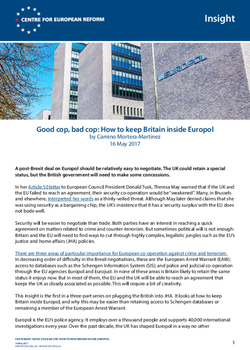
Good cop, bad cop: How to keep Britain inside Europol
A post-Brexit deal on Europol should be relatively easy to negotiate. The UK could retain a special status, but the British government will need to make some concessions.
In her Article 50 letter to European Council President Donald Tusk, Theresa May warned that if the UK and the EU failed to reach an agreement, their security co-operation would be “weakened”. Many, in Brussels and elsewhere, interpreted her words as a thinly-veiled threat. Although May later denied claims that she was using security as a bargaining chip, the UK’s insistence that it has a ‘security surplus’ with the EU does not bode well.
Security will be easier to negotiate than trade. Both parties have an interest in reaching a quick agreement on matters related to crime and counter-terrorism. But sometimes political will is not enough: Britain and the EU will need to find ways to cut through highly complex, legalistic jungles such as the EU’s justice and home affairs (JHA) policies.
There are three areas of particular importance for European co-operation against crime and terrorism. In decreasing order of difficulty in the Brexit negotiations, these are the European Arrest Warrant (EAW); access to databases such as the Schengen Information System (SIS); and police and judicial co-operation through the EU agencies Europol and Eurojust. In none of these areas is Britain likely to retain the same status it enjoys now. But in most of them, the EU and the UK will be able to reach an agreement that keeps the UK as closely associated as possible. This will require a bit of creativity.
This insight is the first in a three-part series on plugging the British into JHA. It looks at how to keep Britain inside Europol, and why this may be easier than retaining access to Schengen databases or remaining a member of the European Arrest Warrant.
In #Europol’s & #UK’s interests to conclude agreement allowing #UK to stay closely involved
Europol is the EU’s police agency. It employs over a thousand people and supports 40,000 international investigations every year. Over the past decade, the UK has shaped Europol in a way no other country has: the British model of intelligence-led security co-operation is now standard procedure at Europol. Currently, Europol has 67 British members of staff. Only the Netherlands (where Europol is headquartered), Spain and Italy have more nationals working at Europol. Up to 40 per cent of data traffic through Europol originates in or is related to the UK. Europol’s director, Rob Wainwright, is a British national and a former MI5 analyst.
After Brexit, the UK will no longer be a full member of Europol, as membership is only open to EU countries. But given Britain’s leading position within the agency, it is both in Europol’s and the UK’s interests to conclude a bespoke agreement allowing the UK to stay as closely involved as possible. Such a deal on Europol, however, will demand flexibility from both the British government and the EU-27.
There are precedents for close co-operation between Europol and non-EU, non-Schengen countries. Europol has association agreements with countries such as the US and Australia. It also has agreements with Norway, Iceland and Switzerland, but these are made easier by the three countries' Schengen membership. Co-operation agreements involve the exchange of information, which includes, for example, threat assessments, and, sometimes, personal data. But none of the existing agreements give third countries direct access to Europol’s databases. Even Denmark, which is an EU and Schengen country but has an opt-out from JHA, does not have unimpeded access to the agency’s information systems.
Denmark has spent the last two years renegotiating its relationship with Europol. The deal, which was concluded in April, allows Denmark to request information from Europol. But Danish police and security services can no longer interrogate databases on their own: all queries have to be processed by the liaison officers at Europol. And in exchange for having limited access to Europol’s data, Copenhagen has to pay into the agency’s budget and accept the oversight of the European Court of Justice (ECJ). In a none-too-subtle hint to Britain, the agreement clarifies that it will only be valid for as long as Denmark remains a member of both Schengen and the EU.
Of course, Denmark is not as important to European security co-operation as Britain. Europol and the UK would benefit from a deal allowing London to maintain direct access to Europol’s databases. For that, the British government will need to keep EU data protection rules in place. The new Europol regulation, which has just come into force, says that the European Parliament must approve co-operation treaties between Europol and non-EU countries (previously only the Council of Ministers had to). And the European Parliament has blocked agreements with countries which (in its view) do not meet EU data protection standards: in 2010, it voted down a deal between the EU and the US on tracking terrorist financing (the ‘SWIFT’ agreement) because it did not respect EU privacy laws.
Retaining EU data protection rules will not only help Britain to get better security deals with Europe, but it will also make EU-UK trade negotiations easier: data transfers are now an essential part of many companies’ business models, and the EU will not allow the data of EU citizens to flow to and from Britain unless its data protection rules are considered robust enough. The ECJ cancelled the EU-US ‘Safe Harbour’ agreement, which allowed transatlantic data transfers, because it thought the US did not meet EU privacy standards. Unlike for non-EU countries, it should be relatively straightforward for the UK to comply with EU data protection standards, as they have been part of British law for over twenty years now. The European Commission will probably insist on reviewing Britain’s compliance with EU data protection every year, as it has done with Switzerland.
Retaining #EU #dataprotection will help #UK get better security deals & ease trade negotiations
The UK should also try to keep at least part of its permanent staff at Europol. Associated countries are allowed to post liaison officers to Europol. The UK could certainly have liaison officers from key agencies and bodies (for example, from HM Revenue and Customs, the National Crime Agency or the Security Service (MI5)). But Britain’s co-operation with Europol would be easier if it could, in addition, retain some positions, with special status, on the agency's permanent staff, to facilitate communication between Europol and the British authorities, including on access to information. The EU-27 could also consider offering Britain a seat on the Management Board (Europol’s governing body). Denmark has retained its seat on the Board, but can no longer vote. Because of the UK’s expertise and experience in shaping Europol, the EU could even allow the British representative to have a vote on some issues, such as Europol’s investigative priorities. This would not mean giving the UK a veto, as the Management Board takes its decisions by majority.
Despite the UK’s contribution to European security, many in Brussels do not want to make too many concessions, lest it encourage other countries to follow the UK out of the EU (however unrealistic a prospect this currently seems). If Theresa May and her government could show that they are willing to make some sacrifices too, this would strengthen their hand in negotiating a special status within Europol. But it may entail compromising in two areas which have long been anathema to Brexiters: the ECJ and the EU budget.
If Britain wants to have a bespoke agreement, it would need to accept, at a minimum, partial ECJ oversight. The EU will insist that the Luxembourg court retains jurisdiction on, at the very least, the validity and interpretation of the EU-UK agreement and on data protection. The UK government may want to accept these terms, if only for practical reasons: any EU-UK co-operation involving access, however partial, to data, will need to be subject to ECJ rulings. Britain may as well agree to have the EU judges supervising the agreement, as it is very unlikely that it will be able to sidestep them.
Paying into Europol’s budget is not compulsory for third countries (Norway does not), but it would be a sign of good-will and could earn Britain a few more perks, especially if London wants to keep British staff stationed at Europol. The UK could negotiate a budget contribution falling short of Denmark’s (Copenhagen pays about as much as a full member, as part of its bilateral agreement with Europol); but London would need to chip in enough money at least to support Europol’s operations on, for example, disrupting smugglers’ networks or dealing with the aftermath of wide-scale cyber attacks.
The British government could also use its good relations with the international intelligence community to help its case. Three out of the five members of the ‘Five Eyes’ alliance (an international co-operation initiative on intelligence sharing) have association agreements with Europol: Australia, Canada and the US – the other two are New Zealand, which does not have a deal with Europol, and the UK. If Britain retains a special status within Europol, allowing it to be ‘half-in, half-out’, it could become a de facto bridge between Europol’s Five Eyes members and the agency’s management structures.
#UK could become de facto bridge between #Europol’s #FiveEyes members and agency’s management
The EU’s guidelines for the Article 50 negotiations make clear that Britain and the EU will only be able to start talking about future security co-operation once they have reached a ‘sufficient understanding’ on issues such as citizens’ rights, the UK’s financial liabilities and Northern Ireland. It will be difficult to reach an agreement on Europol before the UK leaves the EU, in March 2019, as any deal will need to be ratified by the European Parliament. But London and Brussels should try to hammer out the details during the ‘second phase’ of Article 50 negotiations, towards the end of 2018. This will help them to reach an agreement soon after the UK is out of the EU. In the meantime, they should be able to agree on a transitional deal which might allow the UK to retain temporarily the same rights (and obligations) as Europol’s full members.
Both parties will need to be creative in negotiations and think beyond simple political considerations. There may be no precedent for a non-Schengen, non-EU country having preferential status at Europol, but this should not mean that one cannot be created. British and European citizens' security would be seriously compromised if Brussels and London fail to reach an agreement. On Europol, those 500 million people should be allowed to have their cake and eat it.
Camino Mortera-Martinez is a research fellow and Brussels representative at the Centre for European Reform.


Add new comment